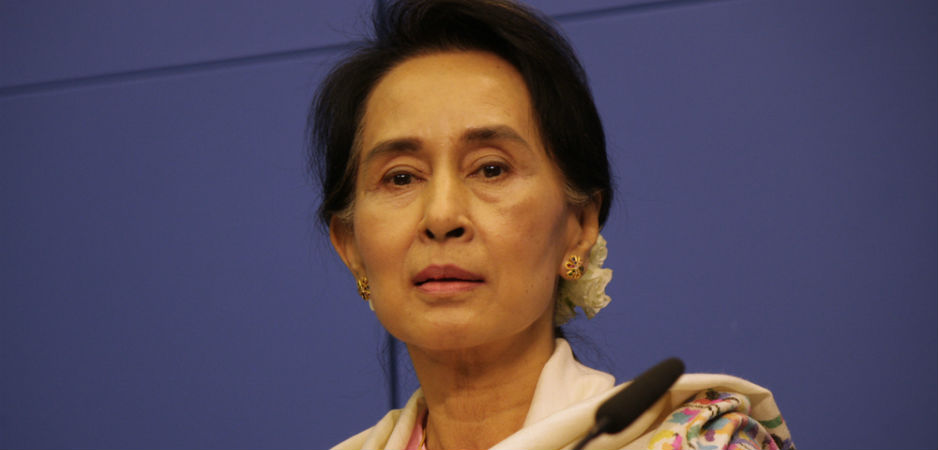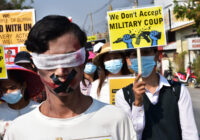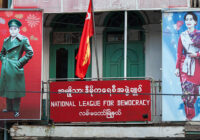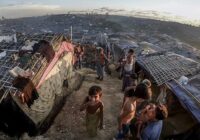The new government has its hands full in bringing a more inclusive and genuine democratic system to Myanmar.
By most accounts, November 8 marked a watershed moment in Myanmar’s struggle for democracy. For a country with a long history of military rule, there are plenty of reasons for pro-democracy forces to celebrate.
With an estimated 80% voter turnout, most electoral observers declared the voting process to be largely smooth and peaceful. Despite structural disadvantages and credible reports of some electoral irregularities both before and during the election, Aung San Suu Kyi’s National League for Democracy (NLD) was able to repeat a landslide victory, reminiscent of the party’s 1990 electoral success.
Most importantly, the military leadership, as well as the ruling Union Solidarity Development Party (USDP), indicated that they would accept the results. Unlike the ill-fated 1990 elections, the NLD will finally be able to form a new government.
The Military’s Democracy
Despite this positive outlook for the NLD, the real fight over the political direction of the country is only just beginning. Critically, since reforms began in 2011, Myanmar has not been transitioning to what would commonly be considered a genuine “democracy.” Rather, it has been undergoing a carefully controlled transformation toward the military’s version of a “disciplined multi-party democratic system.”
Under the military-drafted 2008 constitution, this multi-party system is underpinned by several “disciplined” features, notably the institutionalization of a permanent political role for the military in any further governments. Three key cabinet portfolios (minister of defense and security, minister for home affairs and minister of border affairs) are directly appointed by the commander-in-chief. This ensures that the military continues to exert control over areas that reflect its core interests—the army’s continued influence over Myanmar’s political economy, but also on issues of political stability, sovereignty, national and border security, and relations (or lack of) with the country’s armed ethnic groups and its international neighbors.
The military is also guaranteed 25% of seats at all levels of parliament, which effectively allows the army the power to veto any significant changes to the 2008 constitutional framework. Any attempt to remove pro-military biases within the constitution will require more than 75% of the votes by both houses of parliament before any proposed amendments are voted in by a popular referendum.
In short, unlike the situation in 1990, the military no longer needs to rule directly, nor resort to repressive tactics to ensure its core interests are protected. Under a disciplined “democratic” system, even when a new government is formed in 2016, the military would likely continue to yield immense political power—at least in areas of its predominant interest, likely with little civilian oversight.
Further, although Suu Kyi clearly has the electoral mandate, she is constitutionally barred from becoming the next president on account of her sons having foreign citizenship. She has, however, already indicated that she would be “above the president” and will essentially lead any NLD government. In the long-run, this could have the potential for a political (and constitutional) crisis.
But more pressing perhaps is how the new NLD government will balance its commitment to introduce an inclusive democratic system, while ensuring that the military stays on board with the new government—relations that are crucial for Myanmar to achieve genuine reconciliation.
An Inclusive System
Aside from addressing the difficulty of creating sustainable civilian-military relations, unresolved issues between ethnic groups remain one of the biggest challenges, with growing anti-Muslim sentiments throughout Myanmar, as well as ongoing conflict in the ethnic peripheries, where fighting has not only resumed, but intensified in recent years.
Significant numbers of ethnic minorities, including the Kachins and the stateless Rohingyas, remain in internally displaced persons (IDP) camps.
The Association for the Protection of Race and Religion (popularly known as Ma Ba Tha) failed to make any significant dent on the NLD’s electoral success and have clearly lost significant grassroots support. Yet Ma Ba Tha have shaped a dangerous ultra-Buddhist nationalist narrative at the expense of shrinking citizenry and representation for the country’s Muslim populace.
Leading up to the elections, hundreds of thousands of Muslims had their right to vote stripped, while others, including domestic and overseas migrants as well as those living in conflict zones, were also disenfranchised. In a country with at least a 5% Muslim population, not only were Muslim candidates underrepresented in the elections, but none of the 20-odd Muslim candidates were able to win any seats.
Thus, although the voting process was mostly fair, as indicated by the overwhelming victory of the NLD, it was certainly not free—instead marred by a systematic exclusion of various minority groups.
How and whether the new NLD government would eventually tackle these problems will indicate whether Myanmar is moving toward a more inclusive and genuine democratic system, or whether the military’s way to democracy prevails.
The views expressed in this article are the author’s own and do not necessarily reflect Fair Observer’s editorial policy.
Photo Credit: 360b / Shutterstock.com
 We bring you perspectives from around the world. Help us to inform and educate. Your donation is tax-deductible. Join over 400 people to become a donor or you could choose to be a sponsor.
We bring you perspectives from around the world. Help us to inform and educate. Your donation is tax-deductible. Join over 400 people to become a donor or you could choose to be a sponsor.
Support Fair Observer
We rely on your support for our independence, diversity and quality.
For more than 10 years, Fair Observer has been free, fair and independent. No billionaire owns us, no advertisers control us. We are a reader-supported nonprofit. Unlike many other publications, we keep our content free for readers regardless of where they live or whether they can afford to pay. We have no paywalls and no ads.
In the post-truth era of fake news, echo chambers and filter bubbles, we publish a plurality of perspectives from around the world. Anyone can publish with us, but everyone goes through a rigorous editorial process. So, you get fact-checked, well-reasoned content instead of noise.
We publish 2,500+ voices from 90+ countries. We also conduct education and training programs
on subjects ranging from digital media and journalism to writing and critical thinking. This
doesn’t come cheap. Servers, editors, trainers and web developers cost
money.
Please consider supporting us on a regular basis as a recurring donor or a
sustaining member.
Will you support FO’s journalism?
We rely on your support for our independence, diversity and quality.






